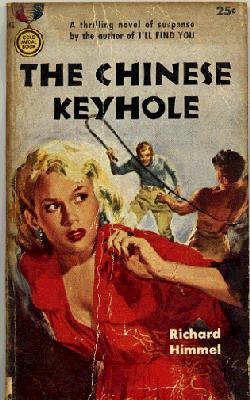The Steamy East (6)11 years to 1997By Mark SchreiberMainichi Daily News In the blurb on the back cover of The Chinese Keyhole, published in 1951, the American protagonist smashes his way "through a mess of murder, mayhem, lust and sadism to the Chinese Keyhole, where hell was set to music." Since the 1950s and 60s, when the professional "China watchers" began gathering in Hong Kong to observe the goings-on behind the Bamboo Curtain, the colony has increasingly become the setting for novels --- and films --- of excitement, mystery and suspense. Novels of note with Hong Kong In the title include A Coffin from Hong Kong (1962) by James Hadley Chase, Mignon G. Eberhart's 1968 mystery thriller Message from Hong Kong and more recently, Dorothy Gilman's middle aged female CIA operative Mrs. Pollifax, who makes another appearance in Mm. Pollifax and the Hong Kong Buddha 1985). (The story, about an attempt by die-hard Chinese Nationalists on Taiwan to thwart the British Chinese agreement, was echoed in Robert Ludlum's still current bestseller, The Bourne Supremacy.) The legacy of piracy and smuggling on the China Seas continues in Hong Kong even today. A major source of crime is an underground organization known as the Triads. Often referred to as the Chinese Mafia, they are direct descendants of such secret organizations as the White Lotus Society, founded in the 12th century, whose purpose was to resist foreign domination and restore Chinese rule. In modern times, these groups have been transplanted overseas as well, and Chinese Nationalist leaders Sun Yat-sen and Chiang Kai-shek were said to have been among the members. Not all triad organizations were engaged in criminal activities, but their insistence on secrecy makes them suspect by law enforcement authorities. New members are brought in with mystical initiation rituals, at which they must pledge never to betray the organization on pain of death by "a myriad of swords --- a term which is usually given in English as the in excruciating "Death of a Thousand Cuts." There are numerous novels involving the activities of the Hong Kong triads, including a gang called the Black Phoenix in The Kung Fu Avengers (1975). Others include The Chinese Consortium by Wolf Rilla (1979) and Terror of the Triads by Sean O'Callaaghan (1982) Hong Kong is the location for numerous adventure stories and spy thrillers. Hooligan (1968) by David Dodge, is the story of a U.S. Treasury agent sent to assassinate, a Hong Kong financier who is draining the U.S. Treasury by sending too many dollars to Beijing. Pangolin (1979), another recommended thriller, is about an attempt to kidnap and hold the top U.S. intelligence officer in the Far East for ransom. In terms of unusual titles, my personal favorite is a 1974 paperback by Terry Harknett entitled The Sweet and Sour Kill. It should also be noted that the crown colony has also long served as an exit point from China. Books involving daring escapes over the Chinese border include Secret: Hong Kong (1962), The Deadly Eurasian (1967) and The Confucius Enigma (1982) by Margaret Jones. Billed as a tale of takeovers, mergers, wheeling and dealing with millions while staving off bankruptcy, James Clavell's Noble House (1981), which takes place in Hong Kong between 1960 and 1963, is a prime example of entrepreneurial one upmanship, and represents a continuation of his epic novel Taipan. The Years of the Hungry Tiger (1974) by John Gordon Davis, is notable for its portrayal of the city during Mao's tumultuous Cultural Revolution in 1966. The year 1977 had not one but two blockbuster novels situated in Hong Kong: Robert Elegant's bestseller Dynasty ties in the colony's history with the remarkable Sekloongs, tracing the family from, its Irish Chinese ancestral roots back in the 1850s, and bringing the history up to the 1970s. John Le Carre's The Honorable Schoolboy, by England's master of spy fiction, centers around Soviet intelligence operations in the Far East at the time of the collapse of Vietnam and Cambodia. Only one long-running series of fiction set in Hong Kong comes to mind, but it is still current and definitely recommended. This is Australian William Marshall's Yellowthread Street series, which started with an eponymous novel in 1975. The offbeat, highly humorous mysteries feature Detective Chief Inspector Harry Feiffer, a British cop, and Christopher O'Yee, an American policeman of Chinese-Irish parentage. With only 11 years to go before 1997 (at the time of this column's writing), needless to say a great deal of attention is now being focused on what will happen when the British colony reverts to Chinese control. If political commitments are honored, Hong Kong will be allowed a degree of autonomy in which the world's most freewheeling style of capitalism will continue to flourish. Still, the colony's 6 million citizens eye the prospects of their future reunification with China with one nervous collective eye on the duty-free departure lounge at the (now defunct) Kai Tak airport. |
www.wetherall.org
